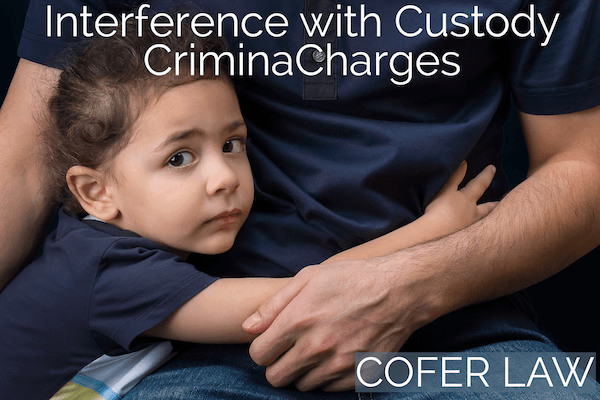Parental Abduction: Can a Parent Kidnap Their Own Child in Texas?
Unfortunately, many divorces, civil suits, and child custody battles result in a nasty game of tug-of-war over the children in a family. Many parents believe that hiding their children and keeping them from seeing the other parent is a good way to “get even.” Some even attempt to flee with the child. Not only can this lead to significant ramifications for the offending parent in a custody suit court, but it can also lead to criminal charges. Parental kidnapping is a complex area of the law involving a mixture of the Penal and Family Codes. Here we address one notable area: the taking of a child by his or her biological parent. Before we move on, if you have an attorney in a family or criminal case, listen to their advice. This post is not a replacement for sound legal counsel.

Parental Kidnapping
In Texas, kidnapping is a Third Degree Felony and occurs when a person intentionally or knowingly abducts another person. It is a defense to a Kidnapping charge if you: (1) did not use or threaten to use deadly force; (2) you are a parent of the child; and (3) your sole intent was to assume lawful physical control of the child. When a parent takes their own child, pay attention to the term “lawful control” in the statute. Lawful control exists if the person has a right under the law, usually the Texas Family Code, to possession of the child. It is not what the person believes is right or wrong regarding the child, but rather the parent’s rights provided by law or a court order. Lugo v. State, 923 S.W.2d 598 (Tex. App. – Houston [1st Dist.] 1995, writ denied).
Can a parent be charged with kidnapping? Yes, in Texas state court, a parent can be charged with kidnapping their own child if they did not have the right to lawful control of their child. In Hugo, the biological father took the child away from the mother and fled to Mexico. The court found that the father did not present evidence that he had lawful control of the child because he took no legal action to gain custody, he was not married to the mother, and he was not acting as the agent of someone who did have lawful control. Id. The federal law is different.
What About Federal Kidnapping Laws?

The Federal Kidnapping statute specifically exempts parents from being charged for kidnapping under federal law. However, a biological parent who has had their parental rights terminated is not exempt and can be federally charged.
Beware: Interference with Child Custody

A parent may be charged with kidnapping, and Texas has another law that specifically addresses parental abduction. A person commits the offense of Interference with Child Custody if he or she takes or retains a child younger than 18 years of age:
- when the person knows that the person’s taking or retention of the child violates the express judgement or order of a court disposing of the child’s custody;
- when the person has not been awarded custody by a court, knows that a suit involving the child’s custody has been filed, and takes the child out of the judicial district if the court is a district court or out of the county if the court is a county court, without the permission of the court and with intent to deprive the court of authority over the child; or
- It is a defense to prosecution of this clime if you return the child to the geographic area composing the judicial district, if a district court, or the county, if a county court, within three days after the date of the offense.
- However, this does not apply if, at the time of the offense, the person taking the child was entitled to possession of or access to the child and was fleeing actual or attempted family violence against the child or the person.
- It is an affirmative defense to this subsection that (1) the taking or retention of the child was pursuant to a valid order providing for possession of or access to the child, or (2) the actor’s retention of the child was due only to circumstanced beyond their control and the actor provided notice or attempted o provide notice to the other person entitled to possession/access to the child.
Tex. Penal Code Ann. § 25.03 (West, WestlawNext through 2015 Reg. Sess.)
A non-custodial parent, who is one that is not acting as a conservator of the child at the time of the offense, commits the offense if, with the intent to interfere with the lawful custody of a child younger than 18 years, the non-custodial parent knowingly entices or persuades the child to leave the custody of the custodial parent, guardian, or person representing the custodial parent or guardian. Id.
Interference with Child Custody is a State Jail Felony that can result in serving between 180 days and two years in state jail and/or up to a $10,000 fine.
Id.
As you can see, even if you believe you have the “right” to take your child, it can lead to serious legal consequences. If someone illegally takes your child, contact police. If you are accused of illegally taking your child, contact a criminal defense attorney. For child abduction or interference with custody criminal charges, contact our office. We are here to help.